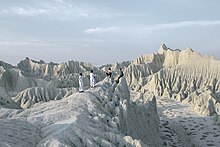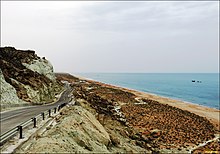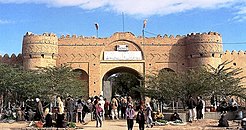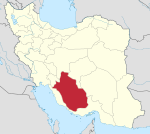Sistan and Baluchestan province
Sistan and Baluchestan Province استان سیستان و بلوچستان
- سݔستان ءُ بلۏچستانءِ استان | |
|---|---|
 | |
 Map of Iran with Sistan and Baluchestan province highlighted | |
| Coordinates: 28°17′N 61°07′E / 28.283°N 61.117°E[1] | |
| Country | Iran |
| Capital | Zahedan |
| Counties | 26 |
| Government | |
| • Governor-general | Mansour Bijar |
| Area | |
• Total | 180,726 km2 (69,779 sq mi) |
| Population (2016)[2] | |
• Total | 2,775,014 |
| • Density | 15/km2 (40/sq mi) |
| Demonym | Baloch & Sistani |
| Time zone | UTC+03:30 (IRST) |
| ISO 3166 code | IR-11 |
| Main language(s) | Baluchi Persian |
| HDI (2017) | 0.688[3] medium · 31st |
Sistan and Baluchestan province (Persian: استان سيستان و بلوچستان)[a] is the second largest of the 31 Provinces of Iran, after Kerman Province, with an area of 180,726 km2. Its capital is the city of Zahedan.[4] The province is in the southeast of the country, bordering Afghanistan and Pakistan.[5][6]
History
In the inscriptions at Behistun and Persepolis, Sistan is mentioned as one of the eastern territories of Darius the Great. The name Sistan, as mentioned above, is derived from Saka (also sometimes Saga, or Sagastan), a Central Asian tribe that had taken control over this area in the year 128 BC. During the Arsacid dynasty (248 BC to 224 AD), the province became the seat of Suren-Pahlav Clan. From the Sassanid period until the early Islamic period, Sistan flourished considerably.
During the reign of Ardashir I of Persia, Sistan came under the jurisdiction of the Sassanids, and in 644 AD, the Arab Muslims gained control as the Persian empire was in its final moments of collapsing.
During the reign of the second Sunni caliph, Omar ibn Al-Khattab, this territory was conquered by the Arabs and an Arab commander was assigned as governor. The famous Persian ruler Ya'qub-i Laith Saffari, whose descendants dominated this area for many centuries, later became governor of this province. In 916 AD, Baluchestan was ruled by the Daylamids and thereafter the Seljuqids, when it became a part of Kerman. Dynasties such as the Saffarids, Samanids, Qaznavids, and Seljuqids, also ruled over this territory.
In 1508 AD, Shah Ismail I of the Safavid dynasty conquered Sistan. After the assassination of Nader Shah in 1747, Sistan and Balochistan became part of the Brahui Khanate of Kalat, which ruled it till 1896. Afterwards, it became part of Qajar Iran.[7]
Demographics
Ethnicity
The Baloch form a majority 90% of the population and the Persian Sistani a minority. Smaller communities of Kurds (in the eastern highlands and near Iranshahr); the expatriate Brahui (along the border with Pakistan); and other resident and itinerant ethnic groups, such as the Romani, are also found within the province.
Most of the population are Balōch and speak the Baluchi language, although there also exists among them a small community of speakers of the Indo-Aryan language Jadgali.[8]: 25 Baluchestan means "Land of the Balōch"; Sistani are the second largest ethnic group in this province who speak the Sistani dialect of Persian.[citation needed]
Religion

The minority Sistani people of Sistan and Baluchestan province are Shia Muslims, and the majority Baloch people of the Baluchestan area in the province are Sunni Muslims, belonging to hanafi..[9][10][11]
Population
At the time of the 2006 National Census, the province's population was 2,349,049 in 468,025 households.[12] The following census in 2011 counted 2,534,327 inhabitants living in 587,921 households.[13] The 2016 census measured the population of the province as 2,775,014 in 704,888 households.[2]vember 2020}}</ref>
Administrative divisions
The population history and structural changes of Sistan and Baluchestan Province's administrative divisions over three consecutive censuses are shown in the following table.
| Counties | 2006[12] | 2011[13] | 2016[2] |
|---|---|---|---|
| Bampur[b] | — | — | — |
| Chabahar | 214,017 | 264,051 | 283,204 |
| Dalgan[c] | — | 62,813 | 67,857 |
| Dashtiari[d] | — | — | — |
| Fanuj[e] | — | — | 49,161 |
| Golshan[f] | — | — | — |
| Hamun[g] | — | — | 41,017 |
| Hirmand[h] | — | 65,471 | 63,979 |
| Iranshahr | 264,226 | 219,796 | 254,314 |
| Khash | 161,918 | 155,652 | 173,821 |
| Konarak | 68,605 | 82,001 | 98,212 |
| Lashar[i] | — | — | — |
| Mehrestan[j] | — | 62,756 | 70,579 |
| Mirjaveh[k] | — | — | 45,357 |
| Nik Shahr | 185,355 | 212,963 | 141,894 |
| Nimruz[g] | — | — | 48,471 |
| Qasr-e Qand[l] | — | — | 61,076 |
| Rask[m] | — | — | — |
| Saravan | 239,950 | 175,728 | 191,661 |
| Sarbaz | 162,960 | 164,557 | 186,165 |
| Sib and Suran[n] | — | 73,189 | 85,095 |
| Taftan[o] | — | — | — |
| Zabol | 317,357 | 259,356 | 165,666 |
| Zahedan | 663,822 | 660,575 | 672,589 |
| Zarabad[p] | — | — | — |
| Zehak | 70,839 | 75,419 | 74,896 |
| Total | 2,349,049 | 2,534,327 | 2,775,014 |
Cities
According to the 2016 census, 1,345,642 people (over 48% of the population of Sistan and Baluchestan province) live in the following cities:[2]
| City | Population |
|---|---|
| Adimi | 3,613 |
| Ali Akbar | 4,779 |
| Bampur | 12,217 |
| Bazman | 5,192 |
| Bent | 5,822 |
| Bonjar | 3,760 |
| Chabahar | 106,739 |
| Dust Mohammad | 6,621 |
| Espakeh | 4,719 |
| Fanuj | 13,070 |
| Galmurti | 10,292 |
| Gosht | 4,992 |
| Hiduj | 1,674 |
| Iranshahr | 113,750 |
| Jaleq | 18,098 |
| Khash | 56,584 |
| Konarak | 43,258 |
| Mehrestan | 12,245 |
| Mirjaveh | 9,359 |
| Mohammadabad | 3,468 |
| Mohammadan | 10,302 |
| Mohammadi | 5,606 |
| Negur | 5,670 |
| Nik Shahr | 17,732 |
| Nosratabad | 5,238 |
| Nukabad | 5,261 |
| Pishin | 16,011 |
| Qasr-e Qand | 11,605 |
| Rask | 10,115 |
| Saravan | 60,014 |
| Sarbaz | 2,020 |
| Sirkan | 2,196 |
| Suran | 13,580 |
| Zabol | 134,950 |
| Zahedan | 587,730 |
| Zarabad | 4,003 |
| Zehak | 13,357 |
The following table shows the ten largest cities of Sistan and Baluchestan province:[2]
| Rank | Name | Population (2016) |
|---|---|---|
| 1 | Zahedan | 587,730 |
| 2 | Zabol | 134,950 |
| 3 | Iranshahr | 113,750 |
| 4 | Chabahar | 106,739 |
| 5 | Saravan | 60,014 |
| 6 | Khash | 56,584 |
| 7 | Konarak | 43,258 |
| 8 | Jaleq | 18,098 |
| 9 | Nik Shahr | 17,732 |
| 10 | Pishin | 16,011 |
Geography
The whole of the province had been previously called Baluchestan, but the government added Sistan to the end of Baluchestan. After the 1979 revolution, the name of the province was changed to Sistan and Baluchestan.
Today, Sistan refers to the area comrising Zabol, Hamun, Hirmand, Zehak and Nimruz counties.[27] The province borders South Khorasan Province in the north, Kerman Province and Hormozgan Province in the west, the Gulf of Oman in the south, and Afghanistan and Pakistan in the east.
Sistan and Baluchestan Province is one of the driest regions of Iran, with a slight increase in rainfall from east to west, and a rise in humidity in the coastal regions. The province is subject to seasonal winds from different directions, the most important of which are the 120-day wind of Sistan, known in Baluchi as Levar; the seventh wind (Gav-kosh); the south wind (Nambi); the Hooshak wind; the humid and seasonal winds of the Indian Ocean; the north wind (Gurich); and the western wind (Gard).
In 2023, Sistan region was affected by several dust events, occurring in April,[28] June,[27] and August. The latter sent 1120 people to hospitals from 10 to 14 August. Winds reached a speed of 108 km/h (67 mph) in Zabol station and reduced visibility to 600 m (2,000 ft).[29]
Sistan and Baluchestan today

Sistan and Baluchestan is the poorest of Iran's 31 provinces, with a HDI score of 0.688.[3]
The government of Iran has been implementing new plans such as creating the Chabahar Free Trade-Industrial Zone.

Economy

Industry is new to the province. Efforts have been done and tax, customs and financial motivations have caused more industrial investment, new projects, new producing jobs and improvement of industry. The most important factories are the Khash cement factory with production of 2600 tons cement daily and three other cement.
Factories under construction:
- Cotton cloth and fishing net weaving factories and the brick factory can be named as well.
The province has important geological and metal mineral potentials such as chrome, copper, granite, antimony, talc, manganese, iron, lead, zinc, tin, nickel, platinum, gold and silver.
One of the main mines in this province is Chel Kooreh copper mine in 120 km north of Zahedan.
Sistan embroidery has been an ancient handicraft of the region that has been traced as far back as 5th-century BC, originating from the Scythians.[30]
Transportation
Road transport
National rail network
The city of Zahedan has been connected to Quetta in Pakistan for a century with a broad gauge railway. It has weekly trains for Kovaitah. Recently a railway from Bam, Iran to Zahedan has been inaugurated. There may be plans to build railway lines from Zahedan to Chabahar.[31]
Airports

Sistan and Baluchistan province has two main passenger airports:
- Zahedan Airport
- Chabahar Airport (Konarak Airport)
Ports
The Port of Chabahar in the south of the province is the main port. It is to be connected by a new railway to Zahedan. India is investing on this port. The port stands on the Coast of Makran and is 70 km west of Gwadar, Pakistan.[32]
Higher education
- University of Sistan and Baluchestan
- Chabahar Maritime University
- Zabol University
- Islamic Azad University of Iranshahr
- Islamic Azad University of Zahedan[33]
- Zahedan University of Medical Sciences[34]
- Zabol University of Medical Sciences
- International University of Chabahar
- Velayat University of Iranshar
- Jamiah Darul Uloom Zahedan
Water
Iran ranks among the most water stressed countries in the world. Sistan-Baluchestan province suffers from major water problems that were aggravated by corruption in Iran's water supply sector, lack of transparency, neglect of marginalized communities, and political favoritism. The IRGC and other politically connected entities control water resources, prioritizing projects for political and economic gain rather than public need. They divert supplies to favored regions, causing shortages in vulnerable provinces like Khuzestan and Sistan-Baluchestan. For example, water diversion projects in Isfahan and Yazd provinces receive priority despite critical shortages in Khuzestan and Sistan-Baluchestan. Reports also indicate that certain agricultural and industrial enterprises with ties to the Iranian Revolutionary Guard Corps (IRGC) have received significant amounts of water, while small farmers and rural communities struggle with severe shortages.[35]
Iran's central government prioritizes water allocation for industrial and urban centers, often at the expense of rural and minority populations. These groups face severe water shortages, ecological degradation, and a loss of livelihoods. This pattern of unequal development not only exacerbates regional disparities but also fuels social unrest and environmental crises. Iran's water policy is also characterized by an overreliance on dam construction and large-scale diversion projects, primarily benefiting politically connected enterprises and urban elites. This has led to the drying of rivers, wetlands, and other vital ecosystems, intensifying dust storms and land subsidence in regions like Khuzestan and Sistan-Baluchestan. Such environmental degradation, combined with insufficient governmental oversight and transparency, worsens living conditions for marginalized communities, reinforcing cycles of poverty and socio-political marginalization.[36]
Gallery
Landmarks such as the Firuzabad Castle, Rostam Castle and the Naseri Castle are located in the province.
- Naseri Castle, Iranshahr
See also
- Balochi cuisine
- Bazman, volcano mountain
- Baloch people
- Sistan region
- Balochistan region
- Balochistan, Afghanistan
- Balochistan, Pakistan
![]() Media related to Sistan and Baluchestan Province at Wikimedia Commons
Media related to Sistan and Baluchestan Province at Wikimedia Commons
Notes
- ^ Also romanized as Ostân-e Sistân o Balučestân; Balochi: سیستان ءُ بلۏچستان اوستان, romanized as Sistàn o Balòcestàn ostàn or Asli Baluchestan
- ^ Separated from Iranshahr County after the 2016 census[14]
- ^ Separated from Iranshahr County after the 2006 census[15]
- ^ Separated from Chabahar County after the 2016 census[16]
- ^ Separated from Nik Shahr County after the 2011 census
- ^ Separated from Saravan County after the 2016 census[17]
- ^ a b Separated from Zabol County after the 2011 census[18]
- ^ Separated from Zabol County after the 2006 census[19]
- ^ Separated from Nik Shahr County after the 2016 census[20]
- ^ Separated from Saravan County and Sarbaz County after the 2006 census[21]
- ^ Separated from Zahedan County after the 2011 census[22]
- ^ Separated from Chabahar County and Nik Shahr County after the 2011 census[23]
- ^ Separated from Sarbaz County after the 2016 census[24]
- ^ Separated from Saravan County after the 2006 census[21]
- ^ Separated from Khash County after the 2016 census[25]
- ^ Separated from Konarak County after the 2016 census[26]
References
- ^ OpenStreetMap contributors (8 January 2025). "Sistan and Baluchestan Province" (Map). OpenStreetMap (in Persian). Retrieved 8 January 2025.
- ^ a b c d e Census of the Islamic Republic of Iran, 1395 (2016): Sistan and Baluchestan Province. amar.org.ir (Report) (in Persian). The Statistical Center of Iran. Archived from the original (Excel) on 23 December 2021. Retrieved 19 December 2022.
- ^ a b "Sub-national HDI – Area Database – Global Data Lab". hdi.globaldatalab.org. Retrieved 13 September 2018.
- ^ Habibi, Hassan (5 March 2013) [Approved 21 June 1369]. Approval of the organization and chain of citizenship of the elements and units of the national divisions of Sistan and Baluchestan province, centered in the city of Zahedan. rc.majlis.ir (Report) (in Persian). Ministry of the Interior, Defense Political Commission of the Government Board. Proposal 3233.1.5.53; Letter 907-93808; Notification 82822/T129. Archived from the original on 24 July 2013. Retrieved 29 December 2023 – via Research Center of the System of Laws of the Islamic Council of the Farabi Library of Mobile Users.
- ^ "معرفی استان سیستان و بلوچستان". hprc.zaums.ac.ir. Retrieved 13 March 2021.
- ^ "آشنایی با استان سیستان و بلوچستان". hamshahrionline.ir. 25 May 2007. Retrieved 13 March 2021.
- ^ "Brahui". Encyclopedia Irannica.
- ^ Delforooz, Behrooz Barjasteh (2008). "A sociolinguistic survey of among the Jagdal in Iranian Balochistan". In Jahani, Carina; Korn, Agnes; Titus, Paul Brian (eds.). The Baloch and others: linguistic, historical and socio-political perspectives on pluralism in Balochistan. Wiesbaden: Reichert Verlag. pp. 23–44. ISBN 978-3-89500-591-6.
- ^ Sistan and Baluchestan Province tabnak.ir. Retrieved 20 July 2020
- ^ "Ahmady, Kameel. A Peace-Oriented Investigation of the Ethnic Identity Challenge in Iran (A Study of Five Iranian Ethnic Groups with the GT Method), 2022, 13th Eurasian Conferences on Language and Social Sciences pp.591-624". 13th Eurasian Conferences on Language and Social Sciences. 2022. Pp.591-624.
- ^ "Baluchistan | History, People, Religion, & Map | Britannica". www.britannica.com. 7 August 2023. Retrieved 7 September 2023.
- ^ a b Census of the Islamic Republic of Iran, 1385 (2006): Sistan and Baluchestan Province. amar.org.ir (Report) (in Persian). The Statistical Center of Iran. Archived from the original (Excel) on 20 September 2011. Retrieved 25 September 2022.
- ^ a b Census of the Islamic Republic of Iran, 1390 (2011): Sistan and Baluchestan Province. irandataportal.syr.edu (Report) (in Persian). The Statistical Center of Iran. Archived from the original (Excel) on 25 November 2022. Retrieved 19 December 2022 – via Iran Data Portal, Syracuse University.
- ^ Jahangiri, Ishaq (c. 2023) [Approved 13 August 1397]. Letter of approval regarding reforms and divisional changes in Sistan and Baluchestan province. qavanin.ir (Report) (in Persian). Ministry of the Interior, Council of Ministers. Proposal 163101. Archived from the original on 7 April 2023. Retrieved 7 April 2023 – via Laws and Regulations Portal of the Islamic Republic of Iran.
- ^ Davodi, Parviz (c. 2013) [Approved 18 September 1386]. Approval letter regarding the reforms of national divisions in Sistan and Baluchestan province, Iranshahr County. rc.majlis.ir (Report) (in Persian). Ministry of the Interior. Proposal 93023/42/4/1; Letter 58538/T26118H; Notification 161466/T38028K. Archived from the original on 3 February 2013. Retrieved 7 April 2023 – via Research Center of the Islamic Council.
- ^ Jahangiri, Ishaq (c. 2023) [Approved 13 September 1398]. Letter of approval regarding the national divisions of Chabahar County, Sistan and Baluchestan province. qavanin.ir (Report) (in Persian). Ministry of the Interior, Council of Ministers. Proposal 20047. Archived from the original on 7 April 2023. Retrieved 7 April 2023 – via Laws and Regulations Portal of the Islamic Republic of Iran.
- ^ Jahangiri, Ishaq (21 December 2019) [Approved 17 October 1399]. "Approval letter regarding some national divisions in Saravan County of Sistan and Baluchestan province". dotic.ir (in Persian). Ministry of Interior, Board of Ministers. Proposal 193481. Archived from the original on 21 January 2021. Retrieved 10 April 2023 – via Laws and Regulations Portal of Iran.
- ^ Rahimi, Mohammad Reza (c. 2023) [Approved 29 September 1391]. "Carrying out national divisions about Saberi and Teymurabad and Nimruz and Hamun Counties of Sistan and Baluchestan province". qavanin.ir (in Persian). Ministry of the Interior, Council of Ministers. Proposal 174107/42/4/1. Archived from the original on 16 April 2023. Retrieved 18 November 2023 – via Laws and Regulations Portal of the Islamic Republic of Iran.
- ^ Davodi, Parviz (c. 2023) [Approved 5 March 1386]. "Reforms of national divisions in Sistan and Baluchestan province, Zabol County". qavanin.ir (in Persian). Ministry of the Interior, Board of Ministers. Proposal 4/1/42/149078; Letter 58538/T26118AH. Archived from the original on 21 July 2023. Retrieved 31 December 2023 – via Laws and Regulations Portal of the Islamic Republic of Iran.
- ^ Jahangiri, Ishaq (c. 2022) [Approved 13 April 1400]. Letter of approval regarding national divisions in Fanuj and Nik Shahr Counties in Sistan and Baluchestan province. qavanin.ir (Report) (in Persian). Ministry of the Interior, Council of Ministers. Proposal 160989. Archived from the original on 31 October 2022. Retrieved 7 April 2023 – via Laws and Regulations Portal of the Islamic Republic of Iran.
- ^ a b Davodi, Parviz (c. 2023) [Approved 29 July 1386]. The approval letter of the Ministers of the Political-Defense Commission of the Government Board regarding some changes and divisions of the country in Sistan and Baluchestan province. lamtakam.com (Report) (in Persian). Ministry of the Interior, Political-Defense Commission of the Government Board. Proposal 93023/42/1/4; Letter 58538/T26118H; Notification 161431/T38028K. Archived from the original on 30 December 2023. Retrieved 30 December 2023 – via Lam ta Kam.
- ^ Rahimi, Mohammad Reza (21 October 2012) [Approved 29 September 1391]. Resolution on the national divisions in Sistan and Baluchestan province. rc.majlis.ir (Report) (in Persian). Ministry of the Interior, Council of Ministers. Proposal 5676/42/4/1; Notification 200666/T46606H. Archived from the original on 10 January 2013. Retrieved 8 January 2025 – via Research Center of the Law System of the Islamic Consultative Assembly of the Farabi Library of Mobile Users.
- ^ Rahimi, Mohammad Reza (c. 2023) [Approved 29 September 1391]. Carrying out reforms of national divisions in Sistan and Baluchestan province. qavanin.ir (Report) (in Persian). Ministry of the Interior, Council of Ministers. Proposal 5603/42/1/1. Archived from the original on 22 March 2023. Retrieved 31 December 2023 – via Laws and Regulations Portal of the Islamic Republic of Iran.
- ^ Jahangiri, Ishaq (c. 2023) [Approved 13 September 1398]. Letter of approval regarding the national divisions of Sarbaz County of Sistan and Baluchestan province. qavanin.ir (Report) (in Persian). Ministry of the Interior, Council of Ministers. Proposal 235379. Archived from the original on 19 April 2023. Retrieved 19 April 2023 – via Laws and Regulations Portal of the Islamic Republic of Iran.
- ^ Jahangiri, Ishaq (4 February 2018) [Approved 13 September 1398]. Approval letter regarding the national divisions of Khash County of Sistan and Baluchestan province. rc.majlis.ir (Report) (in Persian). Ministry of the Interior, Council of Ministers. Proposal 84088; Notification 120508/T56818H. Archived from the original on 24 January 2020. Retrieved 30 December 2023 – via Islamic Parliament Research Center of the Islamic Republic of Iran.
- ^ Jahangiri, Ishaq (16 July 1400) [Approved 13 April 1400]. "National divisions in Dashtiari and Chabahar Counties of Sistan and Baluchestan province". dotic.ir (in Persian). Ministry of the Interior, Council of Ministers. Proposal 160986; Letter 40833. Archived from the original on 11 July 2021. Retrieved 7 April 2023 – via Laws and Regulations Portal of Iran.
- ^ a b "Storm in Sistan sent 330 people to medical centers" توفان در سیستان ۳۳۰ نفر را راهی مراکز درمانی کرد, Tabnak (in Persian), 25 June 2023, 1180454, retrieved 9 April 2024.
- ^ "The storm sent 99 people to the hospital in Sistan region" توفان در منطقه سیستان ۹۹ نفر را راهی بیمارستان کرد, Tabnak (in Persian), 18 April 2023, 1171738, retrieved 9 April 2024.
- ^ "1120 people went to hospital in Sistan and Baluchistan" ۱۱۲۰ نفر در سیستان و بلوچستان راهی بیمارستان شدند. tabnak.ir (in Persian). Tabnak. 14 August 2023. Retrieved 9 April 2024.
- ^ "هفتهزار سال هنر در یک سرزمین" [Seven thousand years of art in one land]. ایسنا (in Persian). 15 March 2017. Retrieved 7 October 2022.
- ^ Projects Invest Iran [dead link]
- ^ "From Gwadar to Chabahar, the Makran Coast Is Becoming an Arena for Rivalry Between Powers". The Wire.
- ^ "دانشگاه آزاد اسلامی واحد زاهدان". iauzah.ac.ir. Retrieved 25 November 2021.
- ^ "Zahedan University of Medical Sciences(zdmu)". 17 July 2007. Archived from the original on 17 July 2007. Retrieved 25 November 2021.
- ^ Kuzma, Samantha; Saccoccia, Liz; Chertock, Marlena (16 August 2023). "25 Countries, Housing One-Quarter of the Population, Face Extremely High Water Stress".
{{cite journal}}: Cite journal requires|journal=(help) - ^ "Water, Corruption, and Security in Iran". New Security Beat. 23 January 2024. Retrieved 14 November 2024.
Bibliography
- W. Barthold (1984). "Sistan, the Southern Part of Afghanistan, and Baluchistan". An Historical Geography of Iran. Translated by Svat Soucek. Princeton University Press. pp. 64–86. ISBN 978-1-4008-5322-9.
- Kameel Ahmady (2019). From border to border. Comprehensive research study on identity and ethnicity in Iran. London: Mehri publication. ISBN 9781914165221.




